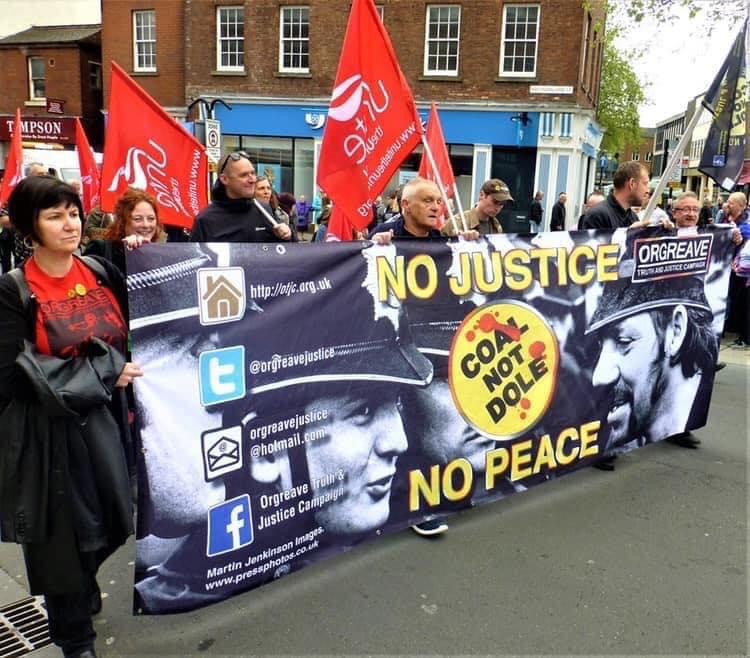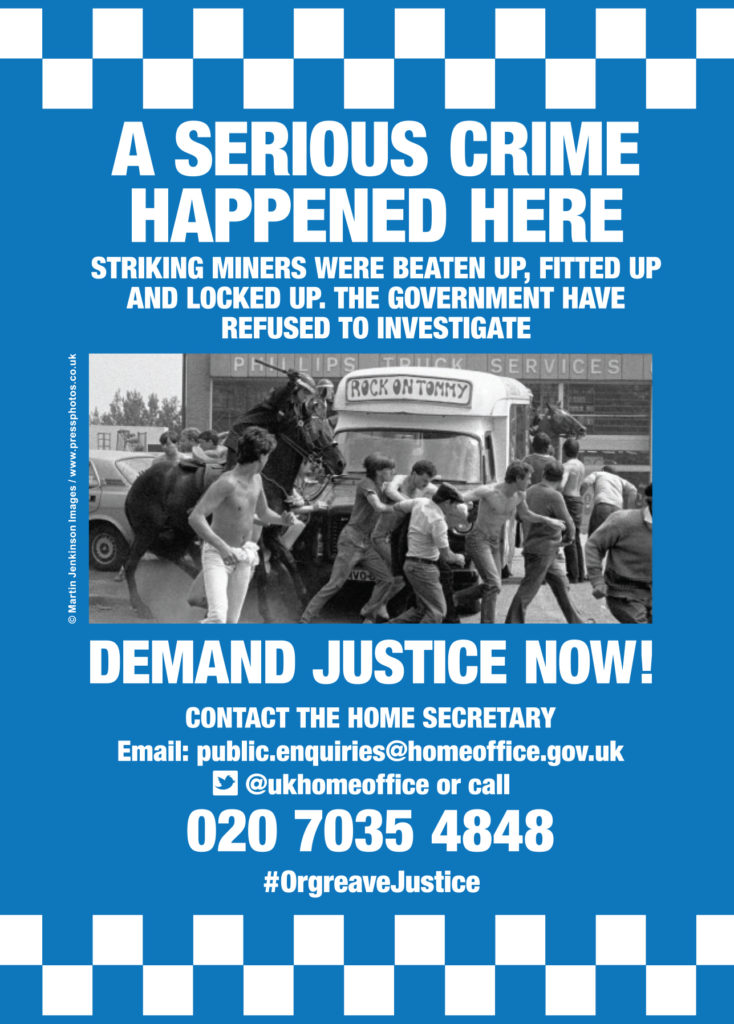Anniversary of the miners' strike - Orgreave 40 years of injustice
By Kate Flannery, Secretary of the Orgreave Truth and Justice Campaign
On 18th June 1984, a paramilitary police force, directed by the state, attacked striking miners picketing the Orgreave coking plant in South Yorkshire. Orgreave became the blueprint for the policing of dissent and sent a harsh message to working class people that strike action would be met by the full force of the state. 40 years later those falsely arrested and injured are still waiting to see justice.
This is the 40th anniversary year of the great 84/85 miners’ strike, a strike against Tory Government plans for mass pit closures and to defend jobs, communities and the trade union movement.
RIDLEY PLAN TO PUNISH THE MINERS
In the 1970s the National Union of Mineworkers (NUM) successfully improved its members’ working conditions and pay, often through industrial action including the spectacular and important victory at Saltley Gate 52 years ago. The miners not only won a considerable and necessary pay rise but were an inspiration to other workers fighting to improve their living standards.
The Tories never forgot the Miners' Strike of 1972, nor that the victory also contributed to their defeat in the 1974 general election. They have been punishing the trade unions ever since. As they planned to win the next election, and, if successful, introduce a mass privatisation programme, they covertly plotted to crush dissent and destroy organised labour, including plans for a more militarised police force they could deploy against striking workers. In 1977 Tory backbencher Nicholas Ridley MP presented the Report of the Nationalised Industries Policy Group to the Party Leader, Margaret Thatcher, with these secret intentions. This 'Ridley Plan' was a detailed document about how to antagonise and win a fight with Britain’s trade union movement. The vicious and hostile plan is necessary reading to help to understand how we got to where we are today. (1)
THE MINERS STRIKE
March 1984 - March 1985 became a year like no other. Approximately three quarters of miners (around 160,000) were on strike to defend jobs, their industry and communities in response to National Coal Board (NCB) plans for the accelerated mass closure of coal mines throughout Britain. The strike was never about pay. The NCB maintained this would initially mean huge job losses of 20,000 but the NUM revealed that the reality was a plan for axing 70,000 jobs. The Tories lied that many of the pits were no longer economically feasible, but their plans had nothing to do with viability and everything to do with revenge and the race to neoliberalism. A very well organised NUM responded with effective action in Scotland, England and Wales. The support and solidarity the strike received throughout Britain and the world was phenomenal. The miners were fighting for all of us.
Police intervention involved forces from all over Britain preventing pickets from gathering in large numbers and stopping miners and supporters travelling to picket and show solidarity. Some police tactics involved obstructing vehicles and threatening arrest, often damaging vehicles if picketers refused to turn back. Some pit villages were often occupied and cordoned off by police in riot gear with imposed curfews and restrictions of movement out of the area.
The policing of the miners’ strike should have shocked the nation. However, the dishonest reporting by most of the broadcast and printed media set the false narrative for the miners’ strike, with Prime Minister Thatcher denouncing striking miners and their supporters as ‘the enemy within’.
ORGREAVE- POLICE RIOT
Three months into the strike, the NUM called for a mass picket of the Orgreave coking plant in South Yorkshire on 18 June 1984 to prevent scab lorries moving coke to the steel works in Scunthorpe. Large pickets had been previously held at Orgreave throughout May and June and the police presence had intensified with brutal and hostile police violence and arrests.
NUM plans were made for miners to travel from all over Britain. Unlike previous occasions when miners had been prevented by the police from travelling to pickets, on this occasion the police did not stop them from reaching their planned destination. On their arrival at the large area of Orgreave on 18 June, while effective NUM picketing was taking place, thousands of the gathering miners were guided to areas where the police had decided that they wanted them to go. There were thousands of police present, from many different forces.
Using the Ridley Plan tactics, the Tories executed their brutal militarised offensive and a police riot followed. Mounted police and dog handlers, and police armed with shields and truncheons, violently attacked the gathering miners, and a snatch squad of police using short shields and truncheons for the first time, chased, battered and incapacitated people at random.
Many miners were seriously injured, some sustaining life-threatening wounds. 95 miners were arrested and charged with unlawful assembly and riot offences that could have resulted in life sentences if convicted. Almost a year later, with all the upset and anguish involved for the miners, their families, comrades and friends, the cases went to court. The prosecution abandoned the case after 48 days of hearing from police witnesses when it became clear that there was a mass fabrication of police evidence and the police had perjured themselves in court.
Government papers released 30 years later prove what was already suspected and known at the time. The Thatcher government was involved in micromanaging police operations at Orgreave and throughout the strike. Some of the arrested miners brought claims for malicious prosecution, assault and unlawful arrest which were settled out of court, with South Yorkshire Police (SYP) paying compensation but without accepting any liability. Neither the police or government have ever admitted any wrongdoing and no police officers were ever prosecuted or disciplined for their violence and lies.
The Tories mobilised unprecedented resources to demonise and criminalise miners, the NUM and its leaders. The full force of the state, involving the media, police, judiciary and social security, was deployed.
ORGREAVE INQUIRY
The Orgreave Truth and Justice Campaign (OTJC) was set up in late 2012 to campaign for a full and independent inquiry into the state organised police riot and conduct at Orgreave. The SYP had referred themselves to the Independent Police Complaints Commission (IPCC) after a BBC Inside Out documentary about policing at Orgreave. The 2012 Hillsborough Independent Panel (HIP) revelations about the 1989 Hillsborough stadium disaster gave renewed hope that an inquiry into the policing of pickets at Orgreave would help to get truth and justice for striking miners.
The NUM, politicians, social justice activists, trade unionists and lawyers have campaigned and worked over many years since the strike to emphasise that what happened at Orgreave was one of the most serious miscarriages of justice in an industrial dispute, the consequences of which can be seen by the system we live in today. Cases of police coverups, criminality and corruption are in the news on a regular basis and activists know only too well about the police abuse of power and lack of accountability.
In June 2015 the IPCC found that police officers had assaulted miners at the mass picket at Orgreave, perverted the course of justice and committed perjury in the failed prosecutions which followed. However, they reported that it was not within their remit to mount a formal investigation.
The OTJC believe that an Orgreave inquiry is in the public interest to put the facts in the public domain and to put an end to years of lies and cover-ups by the Conservative government about the political role they played in orchestrating and managing the pit closure programme in the 1980s, directing militaristic police operations in an industrial dispute and manipulating the courts and media to manufacture a false narrative to demonise and criminalise workers fighting for their jobs and communities.
Despite years of representations from campaigners, politicians, trade unions, lawyers etc, the government continually refuses to allow any kind of Orgreave inquiry. Solidarity and support continue from the Trade Unions, Trades Councils, branches, and activists. Numerous Labour councils have called on various Tory Home Secretaries to order an inquiry. Politicians continue to show support by using parliamentary processes to press for an Orgreave inquiry.
INQUIRY REFUSED - FIGHT GOES ON
The OTJC submitted a detailed and compelling case to the Home Secretary in late 2015 and in October 2016, despite even The Times newspaper reporting there would be some kind of inquiry, the then Home Secretary, Amber Rudd, refused. (2) Her reasons were that there was no miscarriage of justice, policing practices had changed, there was nothing new to learn from what happened over 30 years ago, nobody died and it was not in the public interest.
Since that flawed decision there have been a number of significant developments which serve to heighten the need for some kind of inquiry.
- We have seen the release of Home Office files from 1984/85 and have learnt Association of Chief Police Officers files relating to the miners’ strike are disgracefully embargoed until 2066
- We salute the Scottish Review into policing during the miners’ strike, accepted by the Scottish Parliament including their Conservative MSPs in October 2020, followed by legislation in 2022 (3)
- We have also had insight into Amber Rudd’s real reasons not to hold an inquiry reported in an article in 2021. Rudd was concerned that it would tarnish the legacy of Margaret Thatcher (4)
- In 2023, reporting of the late Queen’s response to the police riot at Orgreave made the headlines when she was said to have been shocked and upset at the scenes (5)
- At the TUC conference 2023, Labour Deputy Leader Angela Raynor confirmed the party’s commitment to justice for Orgreave (6) and this year Shadow Home Secretary, Yvette Cooper reiterated Labour’s commitment to an inquiry (7)
Our OTJC Megaphone Petition demanding an enquiry has been signed by thousands of people. We are not going away. (8)
MINERS' STRIKE 40TH ANNIVERSARY
This year there have been several television documentaries about the policing of the miners' strike and we are grateful to all who have spoken up in this 40th anniversary year not just to remember what happened but to make it clear we still demand justice.
Our campaign continues to reveal the reality about what happened throughout the miners' strike and is creating an awareness amongst younger generations who see that the injustices they campaign against have many similarities with the miners' struggle. The 40th Anniversary events currently taking place throughout Britain are celebrating the amazing resistance and solidarity shared by so many and are using that to reflect on the past to help us organise for the present and the future.
Full details of what OTJC expects from an Inquiry can be found at https://otjc.org.uk/wp-content/uploads/2022/05/ORGREAVE_Leaflet_2022.pdf
Come along and join us and a range of impressive speakers at our March and Rally in Sheffield on Saturday 15th June 2024. https://otjc.org.uk/orgreave-rally-2024/
(1) Ridley Plan https://otjc.org.uk/ridley-plan/
(2) Inquiry into police over 1980s clash with miners (thetimes.co.uk)
(3) Miners’ Strike Pardon Bill passes - gov.scot (www.gov.scot)
(4) Top Tories blocked Orgreave inquiry 'because it would tarnish Thatcher's memory'
(6) Deputy Labour leader, Angela Rayner’s speech to TUC Congress 2023 | TUC
(8) Demand an Orgreave inquiry for truth and justice | Megaphone UK








